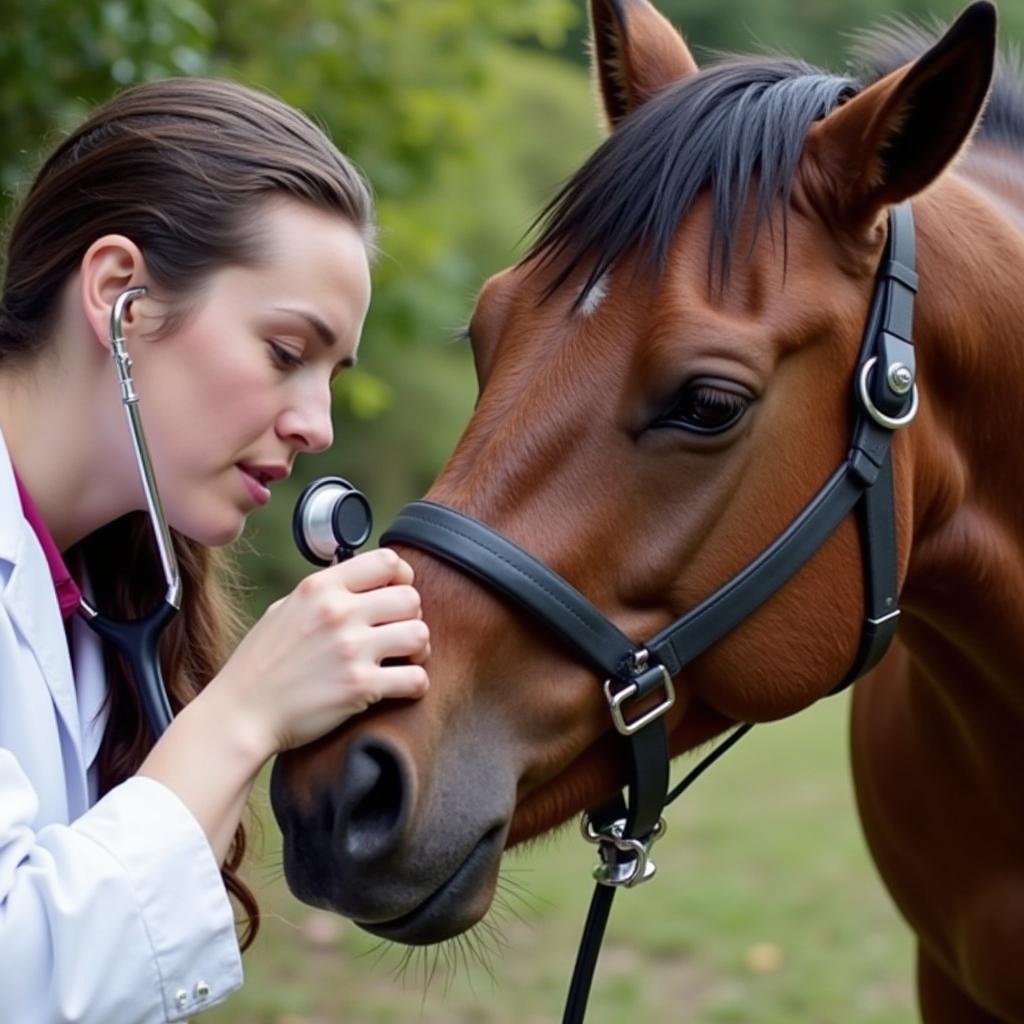A Flared Horse often signals discomfort or pain. Understanding what causes a horse to flare its nostrils can be crucial for their well-being. This article will delve into the reasons behind nostril flaring in horses, what it might indicate, and how to address the underlying issues.
Decoding the Flared Nostril: What Does it Mean?
Nostril flaring, also known as “horse flared”, is a visible sign that something might be amiss with your equine companion. It’s often a subtle clue that can easily be overlooked if you’re not familiar with equine body language. While sometimes a temporary reaction to exertion, persistent flaring warrants further investigation.
Respiratory Distress: A Common Culprit
One of the most common reasons for a flared horse is respiratory distress. This can range from mild allergies to more serious conditions like pneumonia or heaves. Horses with respiratory issues often flare their nostrils to maximize air intake, trying to compensate for restricted airways. horse flared Symptoms like coughing, nasal discharge, and increased respiratory rate often accompany nostril flaring in these cases.
Pain and Discomfort: Silent Signals
Flared nostrils can also indicate pain, whether it’s from colic, lameness, or other underlying medical conditions. Just like humans, horses might express pain through changes in their facial expressions, including flared nostrils. Identifying the source of the pain requires careful observation of other accompanying signs and a thorough veterinary examination.
Exertion and Excitement: Temporary Flaring
Sometimes, nostril flaring can be a normal physiological response to exertion, especially after strenuous exercise. The horse’s body requires more oxygen, leading to increased respiration and temporarily flared nostrils. Similarly, excitement or stress can also cause transient nostril flaring. In these cases, the flaring subsides once the horse returns to a resting state.
Addressing the Issue: From Observation to Veterinary Care
If you notice persistent nostril flaring in your horse, it’s crucial to take action. Start by observing your horse carefully for other symptoms. Is there any coughing, nasal discharge, or changes in behavior? Is the horse showing signs of lameness or colic?
When to Call the Vet: Don’t Wait!
If the nostril flaring is accompanied by other symptoms, or if it persists for an extended period, it’s essential to contact your veterinarian. horse flare They can perform a thorough examination, diagnose the underlying cause, and recommend the appropriate treatment.
Preventing Respiratory Issues: Management Practices
Maintaining good stable hygiene, providing adequate ventilation, and minimizing dust exposure are crucial for preventing respiratory problems in horses. devil horse lures Regularly cleaning stalls, using dust-free bedding, and soaking hay can significantly reduce the risk of respiratory irritants.
Conclusion: A Flared Nostril is a Call to Action
Understanding what a flared horse might be communicating is crucial for responsible horse ownership. Don’t ignore this subtle yet significant sign. By paying attention to your horse’s body language and seeking veterinary care when necessary, you can help ensure their health and well-being.  A veterinarian examining a horse displaying flared nostrils using a stethoscope.
A veterinarian examining a horse displaying flared nostrils using a stethoscope.
FAQs
- Is nostril flaring always a sign of a serious problem?
- What are the most common causes of respiratory distress in horses?
- How can I tell if my horse is in pain?
- When should I call the vet for nostril flaring?
- What are some preventative measures for respiratory issues in horses?
- Can allergies cause nostril flaring in horses?
- What are the different treatments for respiratory problems in horses?
Common Scenarios and Questions:
- Scenario: My horse is flaring its nostrils after a hard workout. Question: Is this normal?
- Scenario: My horse is flaring its nostrils and coughing. Question: What could be wrong?
- Scenario: My horse is flaring its nostrils, and its breathing seems labored. Question: Should I be concerned?
Further Reading:
For more information on horse health and care, check out our other articles on horse riding pants womens and horses cumming in women.
When you need assistance, please contact Phone Number: 0772127271, Email: [email protected] or visit us at QGM2+WX2, Vị Trung, Vị Thuỷ, Hậu Giang, Việt Nam. We have a 24/7 customer service team.